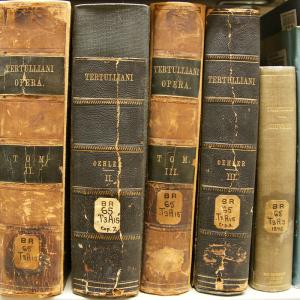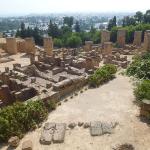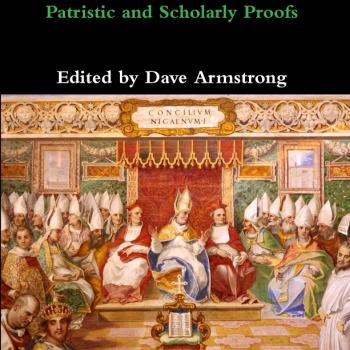Protestant apologists, in tackling the topic of sola Scriptura and whether the Church fathers believed in it or not, very often argue as follows:
Church Father X believes in sola Scriptura, because, look, see!: he praises Scripture in this place and that, and another over there, and says that Christians ought to read the Bible to learn theology! Obviously, then, he agrees with the formal Protestant principle of sola Scriptura! Who could possibly doubt it?
But this is fallacious and illogical through and through. The proper approach to this topic and what a given Church father believed is as follows:
Sola Scriptura (as classically defined by Protestants) means that Scripture is the only final infallible norm and source and standard (rule of faith) for Christian doctrine and faith. It follows from this, that neither the Church, nor ecumenical councils, nor popes, nor sacred, apostolic tradition, nor apostolic succession are infallible sources of authority. They are usually respected by the thinking Protestant, and regarded as authoritative to a degree, but not infallibly so.
We must, therefore, look to see if Church father X thinks Scripture is formally sufficient for authority (not just materially sufficient, which we agree with) without the necessary aid of tradition and the Church, or if he does not, as indicated in other statements. A thinker’s statements regarding Christian authority must be evaluated in context of all of his thought in this area, rather than having pieces taken out and then claiming that they “prove” something that they do not, in fact, prove at all.
In other words, even if we find a quote where a father seems (at first glance) to be stating something akin to sola Scriptura (since he is writing about the Bible without immediate reference to Church or tradition), we must examine what he believes about the (binding?, infallible?) authority of tradition, Church (including ecumenical councils), and apostolic succession, because the very question at hand (what is the rule of faith?) has to do with the relation of all those things (all but Scripture being non-infallible, according to sola Scriptura).
For that reason, their beliefs concerning all these other elements have to be examined, in order to understand properly how they views their relationship vis-a-vis each other, and whether or not they adhere to sola Scriptura. as the rule of faith. If they hold to the infallible authority of anything besides Scripture, they do not believe in sola Scriptura.
The Protestant always puts the Bible above Church and tradition, and denies that the latter two can be infallible. Catholics and Orthodox believe in a three-legged stool, where, practically-speaking, Church and tradition have equal authority with Scripture, because they are the necessary framework and interpretive grid through which Scripture can be properly interpreted in an orthodox sense.
With this in mind, we proceed to determine whether Tertullian believed in sola Scriptura, or the Catholic rule of faith. The material below is from Philip Schaff’s 38-volume collection of the Church fathers. Anglican Church historian J. N. D. Kelly summarizes Tertullian’s view on the rule of faith:
[F]or Tertullian what was believed and preached in the churches was absolutely authoritative . . . on occasion [he] described this original message as tradition, using the word to denote the teaching delivered by the apostles, without any implied contrast between tradition and Scripture . . . Tertullian can refer [de praescr. 21; c. Marc. I, 21;4 5] to the whole body of apostolic doctrine, whether delivered orally or in epistles, as apostolorum traditio or apostolica traditio . . .
Tertullian’s attitude does not differ from Irenaeus’s in any important respect . . . In its primary sense, however, the apostolic, evangelical or Catholic tradition [C. Marc. 4, 5; 5, 19; de monog. 2] stood for the faith delivered by the apostles, and he never contrasted tradition so understood with Scripture . . .
But Tertullian did not confine the apostolic tradition to the New Testament; even if Scripture were to be set on one side, it would still be found in the doctrine publicly proclaimed by the churches. Like Irenaeus, he found [E.g., de praescr. 21; 32; c. Marc. 4, 5] the surest test of the authenticity of this doctrine in the fact that the churches had been founded by, and were continuously linked with, the apostles; and as a further guarantee he added [De praescr. 28] their otherwise inexplicable unanimity . . .
This unwritten tradition he considered to be virtually identical with the ‘rule of faith’ (regula fidei), which he preferred to Scripture as a standard when disputing with Gnostics . . . where controversy with heretics breaks out, the right interpretation can be found only where the true Christian faith and discipline have been maintained, i.e., in the Church [De praescr. 19] . . .
He was also satisfied, and made the point even more forcibly than Irenaeus, that the indispensable key to Scripture belonged exclusively to the Church, which in the regula had preserved the apostles’ testimony in its original shape. . . . the one divine revelation was contained in its fulness both in the Bible and in the Church’s continuous public witness. (Early Christian Doctrines, HarperSanFrancisco, revised 1978 edition, 36, 39-41)
***
The Church
[T]he churches, although they are so many and so great, comprise but the one primitive church . . . (Prescription against Heretics, ch. 20)
[I]t is incredible that these could have been such as to bring in some other rule of faith, differing from and contrary to that which they were proclaiming through the Catholic churches, — as if they spoke of one God in the Church, (and) another at home, and described one substance of Christ, publicly, (and) another secretly, and announced one hope of the resurrection before all men, (and) another before the few; although they themselves, in their epistles, besought men that they would all speak one and the same thing, and that there should be no divisions and dissensions in the church, seeing that they, whether Paul or others, preached the same things. Moreover, they remembered (the words):
Let your communication be yea, yea; nay, nay; for whatsoever is more than this comes of evil;[Matthew 5:37] so that they were not to handle the gospel in a diversity of treatment. (Prescription against Heretics, ch. 26)
Sacred Tradition
It remains, then, that we demonstrate whether this doctrine of ours, of which we have now given the rule, has its origin in the tradition of the apostles, and whether all other doctrines do not ipso facto proceed from falsehood. (Prescription against Heretics, ch. 21)
When, however, that which is deposited among many is found to be one and the same, it is not the result of error, but of tradition. Can any one, then, be reckless enough to say that they were in error who handed on the tradition? (Prescription against Heretics, ch. 28)
Such are the summary arguments which we use, when we take up arms against heretics for the faith of the gospel, maintaining both that order of periods, which rules that a late date is the mark of forgers, and that authority of churches which lends support to the tradition of the apostles; because truth must needs precede the forgery, and proceed straight from those by whom it has been handed on. (Against Marcion, Book IV, ch. 5)
We have it on the true tradition of the Church, that this epistle was sent to the Ephesians, not to the Laodiceans. (Against Marcion, Book V, ch. 17)
For if, even at that time, the tradition of the gospel had spread everywhere, how much more now! Now, if it is our gospel which has spread everywhere, rather than any heretical gospel, much less Marcion’s, which only dates from the reign of Antoninus, then ours will be the gospel of the apostles. (Against Marcion, Book V, ch. 19)
Apostolic Succession
[E]ven if a discussion from the Scriptures should not turn out in such a way as to place both sides on a par, (yet) the natural order of things would require that this point should be first proposed, which is now the only one which we must discuss:
With whom lies that very faith to which the Scriptures belong. From what and through whom, and when, and to whom, has been handed down that rule, by which men become Christians?For wherever it shall be manifest that the true Christian rule and faith shall be, there will likewise be the true Scriptures and expositions thereof, and all the Christian traditions. (Prescription against Heretics, ch. 19)They [the Apostles] then in like manner founded churches in every city, from which all the other churches, one after another, derived the tradition of the faith, and the seeds of doctrine, and are every day deriving them, that they may become churches. Indeed, it is on this account only that they will be able to deem themselves apostolic, as being the offspring of apostolic churches. . . . Therefore the churches, although they are so many and so great, comprise but the one primitive church, (founded) by the apostles, from which they all (spring). In this way all are primitive, and all are apostolic, while they are all proved to be one, in (unbroken) unity, by their peaceful communion, and title of brotherhood, and bond of hospitality — privileges which no other rule directs than the one tradition of the selfsame mystery. (Prescription against Heretics, ch. 20)
From this, therefore, do we draw up our rule. Since the Lord Jesus Christ sent the apostles to preach, (our rule is) that no others ought to be received as preachers than those whom Christ appointed; for
no man knows the Father save the Son, and he to whomever the Son will reveal Him.Matthew 11:27 Nor does the Son seem to have revealed Him to any other than the apostles, whom He sent forth to preach — that, of course, which He revealed to them. Now, what that was which they preached — in other words, what it was which Christ revealed to them — can, as I must here likewise prescribe, properly be proved in no other way than by those very churches which the apostles founded in person, by declaring the gospel to them directly themselves, both vivâ voce, as the phrase is, and subsequently by their epistles. If, then, these things are so, it is in the same degree manifest that all doctrine which agrees with the apostolic churches— those moulds and original sources of the faith must be reckoned for truth, as undoubtedly containing that which the (said) churches received from the apostles, the apostles from Christ, Christ from God. Whereas all doctrine must be prejudged as false which savours of contrariety to the truth of the churches and apostles of Christ and God. It remains, then, that we demonstrate whether this doctrine of ours, of which we have now given the rule, has its origin in the tradition of the apostles, and whether all other doctrines do not ipso facto proceed from falsehood. We hold communion with the apostolic churches because our doctrine is in no respect different from theirs. This is our witness of truth. (Prescription against Heretics, ch. 21)[N]or can they presume to claim to be a church themselves who positively have no means of proving when, and with what swaddling-clothes this body was established. (Prescription against Heretics, ch. 22)
But if there be any (heresies) which are bold enough to plant themselves in the midst of the apostolic age, that they may thereby seem to have been handed down by the apostles, because they existed in the time of the apostles, we can say: Let them produce the original records of their churches; let them unfold the roll of their bishops, running down in due succession from the beginning in such a manner that [that first bishop of theirs ] bishop shall be able to show for his ordainer and predecessor some one of the apostles or of apostolic men, — a man, moreover, who continued steadfast with the apostles. For this is the manner in which the apostolic churches transmit their registers: as the church of Smyrna, which records that Polycarp was placed therein by John; as also the church of Rome, which makes Clement to have been ordained in like manner by Peter. In exactly the same way the other churches likewise exhibit (their several worthies), whom, as having been appointed to their episcopal places by apostles, they regard as transmitters of the apostolic seed. Let the heretics contrive something of the same kind. For after their blasphemy, what is there that is unlawful for them (to attempt)? But should they even effect the contrivance, they will not advance a step. For their very doctrine, after comparison with that of the apostles, will declare, by its own diversity and contrariety, that it had for its author neither an apostle nor an apostolic man; because, as the apostles would never have taught things which were self-contradictory, so the apostolic men would not have inculcated teaching different from the apostles, unless they who received their instruction from the apostles went and preached in a contrary manner. To this test, therefore will they be submitted for proof by those churches, who, although they derive not their founder from apostles or apostolic men (as being of much later date, for they are in fact being founded daily), yet, since they agree in the same faith, they are accounted as not less apostolic because they are akin in doctrine. Then let all the heresies, when challenged to these two tests by our apostolic church, offer their proof of how they deem themselves to be apostolic. But in truth they neither are so, nor are they able to prove themselves to be what they are not. Nor are they admitted to peaceful relations and communion by such churches as are in any way connected with apostles, inasmuch as they are in no sense themselves apostolic because of their diversity as to the mysteries of the faith. (Prescription against Heretics, ch. 32)
Since this is the case, in order that the truth may be adjudged to belong to us,
as many as walk according to the rule,which the church has handed down from the apostles, the apostles from Christ, and Christ from God, the reason of our position is clear, when it determines that heretics ought not to be allowed to challenge an appeal to the Scriptures, since we, without the Scriptures, prove that they have nothing to do with the Scriptures. . . . But on what ground are heretics strangers and enemies to the apostles, if it be not from the difference of their teaching, which each individual of his own mere will has either advanced or received in opposition to the apostles? (Prescription against Heretics, ch. 37)No doubt, after the time of the apostles, the truth respecting the belief of God suffered corruption, but it is equally certain that during the life of the apostles their teaching on this great article did not suffer at all; so that no other teaching will have the right of being received as apostolic than that which is at the present day proclaimed in the churches of apostolic foundation. You will, however, find no church of apostolic origin but such as reposes its Christian faith in the Creator. But if the churches shall prove to have been corrupt from the beginning, where shall the pure ones be found? Will it be among the adversaries of the Creator? Show us, then, one of your churches, tracing its descent from an apostle, and you will have gained the day. (Against Marcion, Book I, ch. 21)
Petrine Primacy / Papacy
Was anything withheld from the knowledge of Peter, who is called
the rock on which the church should be built,who also obtainedthe keys of the kingdom of heaven,with the power ofloosing and binding in heaven and on earth?(Prescription against Heretics, ch. 22)Afterwards, as he himself [St. Paul] narrates, he
went up to Jerusalem for the purpose of seeing Peter,[Galatians 1:18] because of his office, no doubt, . . . (Prescription against Heretics, ch. 23)[T]hey at first were believers in the doctrine of the Catholic Church, in the church of Rome under the episcopate of the blessed Eleutherus, . . . (Prescription against Heretics, ch. 30)
***
Related Reading
For much more on sola Scriptura: see my Bible, Tradition, Canon, & “Sola Scriptura” web page.
For documentation of many more Church fathers who rejected sola Scriptura, see the “Bible” section of my Fathers of the Church web page.
***
Practical Matters: Perhaps some of my 3,900+ free online articles (the most comprehensive “one-stop” Catholic apologetics site) or fifty books have helped you (by God’s grace) to decide to become Catholic or to return to the Church, or better understand some doctrines and why we believe them.
Or you may believe my work is worthy to support for the purpose of apologetics and evangelism in general. If so, please seriously consider a much-needed financial contribution. I’m always in need of more funds: especially monthly support. “The laborer is worthy of his wages” (1 Tim 5:18, NKJV). 1 December 2021 was my 20th anniversary as a full-time Catholic apologist, and February 2022 marked the 25th anniversary of my blog.
PayPal donations are the easiest: just send to my email address: [email protected]. You’ll see the term “Catholic Used Book Service”, which is my old side-business. To learn about the different methods of contributing, including 100% tax deduction, etc., see my page: About Catholic Apologist Dave Armstrong / Donation Information. Thanks a million from the bottom of my heart!
***
Photo credit: romana klee (11-19-10). Books by Tertullian [Flickr / CC BY-SA 2.0 license]
***
Summary: Tertullian didn’t believe in sola Scriptura, & fully accepted the sublime authority of the Church, sacred tradition, apostolic succession, & Petrine primacy.














